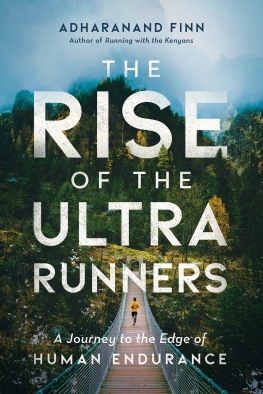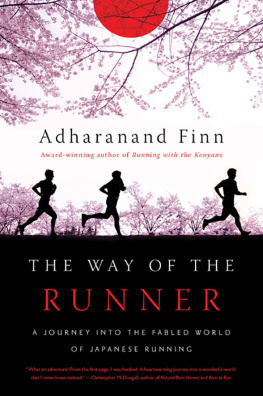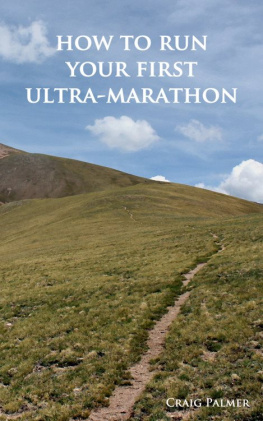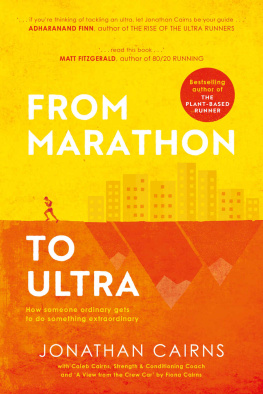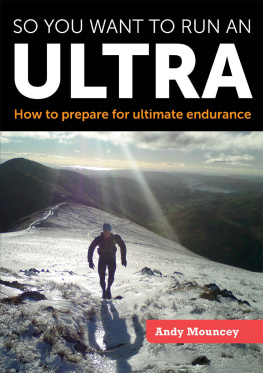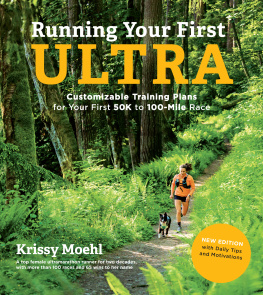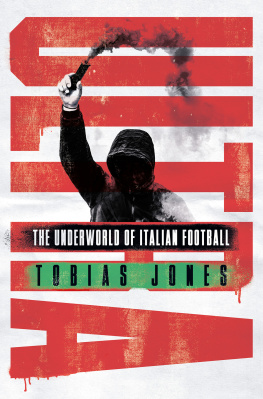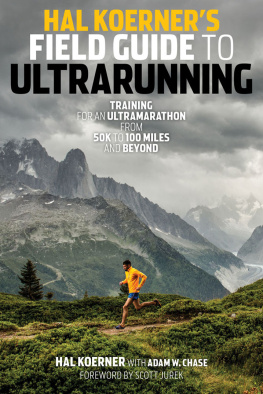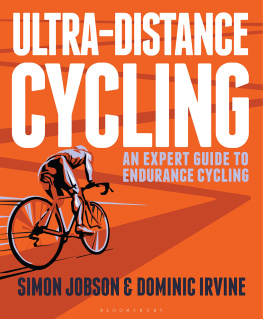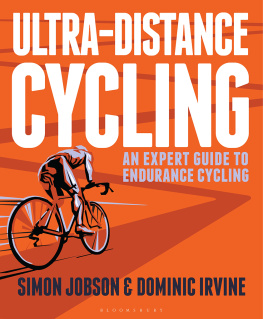Contents
Guide

THE
RISE
OF THE
ULTRA
RUNNERS
A Journey to the Edge of Human Endurance
ADHARANAND FINN

THE RISE OF THE ULTRA RUNNERS
Pegasus Books Ltd.
148 W 37th Street, 13th Floor
New York, NY 10018
Copyright 2019 by Adharanand Finn
First Pegasus Books cloth edition May 2019
Interior design by Maria Fernandez
All rights reserved. No part of this book may be reproduced in whole or in part without written permission from the publisher, except by reviewers who may quote brief excerpts in connection with a review in a newspaper, magazine, or electronic publication; nor may any part of this book be reproduced, stored in a retrieval system, or transmitted in any form or by any means electronic, mechanical, photocopying, recording, or other, without written permission from the publisher.
Library of Congress Cataloging-in-Publication Data is available.
ISBN: 978-1-64313-135-1
ISBN: 978-1-64313-164-1 (ebk.)
Distributed by W. W. Norton & Company
We should always be struggling to know.
Know, then, thyself.
Geoff Oliver, age eighty-five, after running 77 miles
at the Tooting 24-hour track race in south London
PROLOGUE
I m slumped on the ground, my back against a mound of sand, staring out through smudged, yellow sunglasses. All I can see, as far as the sky, is sand. Sand with scratches of dry grass. A wasteland. A faint trail runs through it. Tyre tracks that suggest civilisation cant be far away. But Im not moving. My legs are like two bits of rusted machinery Ive been dragging along with me for days. It feels good to put them down. My groin, right where the front of my left leg fuses onto my body, screeches and grinds with each step when I run, but sitting here, it becomes a faint, almost pleasurable pain.
My thoughts seem to exist outside of myself. My essence, my core being, is just sitting here, melting into the sand, too exhausted to think. But the officers in my head, those left in charge of making sure I stay alive, are in frantic discussion.
I cant sit here all day. Im low on water. The sun is too hot. Ive come too far. Think of all that distance youve run. Countless miles across this soul-sapping sand. You cant stop now. The end, the beach, the sea is only a few miles away. You can do it, one small step at a time. You didnt come all this way to quit this close to the finish.
I recall vaguely the various strategies Ive used to keep myself going up until now. When things first got tough, around Day Two, I got myself pumped up. Come on, tough guy, I told myself. You can do this. You show them. The desert may be tough, but it wont stop Mr Finn. I actually called myself Mr Finn. The race was already twisting my brain.
By Day Five, though, the bravado had been replaced by tenderness as I cajoled myself along through the night stage. Its OK, dont worry, youll make it. Youre going to be fine, just keep moving. The night lay dark and still around me. The sand under my feet brutally soft. But I got through it. Twenty-six miles in seven and a half hours. I got there.
But now, so close to the end, my will has run dry. The voices in my head are futile. Im not moving.
Thats what youre supposed to do, get up and drag yourself to the finish. But why? Who set up these stupid rules? You dont have to play along like some prize poodle. This is interesting. I shuffle myself around so the grass is less spiky, stretching my legs, pushing my feet out in front of me. My shoes are full of sand, like theyre about three sizes too small. Ive been coping with it for days. Its a minor irritant, among everything else.
The really courageous thing to do, right now, the genius in my head continues, would be to listen to yourself, not everyone else. Everyone else will tell you that you have to finish, that nobody quits this close to the end. But youre different. You play by your own rules. You have nothing to prove. If you want to stop, you just stop. Sitting here, not moving, is beginning to feel like the ultimate act of rebellion. Im quickly turning into the James Dean of desert running. Someone will come and find me eventually. Theyll try to egg me on to the finish, but I wont play ball. Ill show them. I play by my own rules.
Hey, Finn! I look up. An elderly German couple in their sixties are standing over me. I cant quite tell if theyre smiling or grimacing.
Are you OK? Gudrun asks me kindly. She looks in shock.
Come on, get up, barks Hansmartin. Follow us.
Before I know it Im hauling myself up and were walking off in single file. Wading through the sand again, my groin wincing. Everything, my clothes, my backpack, my headscarf, is stuck to me with sweat. For days the sun has had me in its vice, slowly squeezing, wringing both my body and spirit dry. But now Im up and moving again, following Hansmartins commanding footsteps. Nobody speaks. Theyre nearly as exhausted as I am, but we plough on. Its only walking, although they have poles and are striding along fairly seriously. I watch Hansmartins lolling backpack as he picks his way through the tufts of sand. And, eventually, I begin to recover. I begin to feel a tiny spasm of life return to my legs. My head starts to clear. Without even meaning to, I start to trot.
Ah, good, good, he says. Go. We will see you at the finish. And with that I begin to run. The dunes are rising up like mountains now, the biggest dunes of the race, but I can almost smell the sea. I take off my glasses and shove them in my pocket. The sand is white. I scale the giant, shifting slopes, skipping and stumbling down the other side. I imagine Im a child, excited, running for the sea.
A few times I think Im there, but another dune looms up before me. But Im high on adrenaline now. I can sense the finish, calling to me. And then, suddenly, Im there. An arc of balloons. Tents. People lolling in the waves. Im almost the last finisher and most people are already relaxing in camp, cooking food, washing their clothes. A couple of Dutch runners spot me crossing the line and offer me a muted round of applause, but theyve long since lost their enthusiasm for cheering people across the finish. A bored photographer steps out from his seat in the shade and points his camera at me. He asks me how I feel. For the race video, he says.
I dont know what to say. After everything Ive been through I should be bubbling over with emotion, but instead I feel strangely muted.
That was hard, is all I can muster. Bloody hard. And with that I unclip my backpack and stumble down the beach and walk straight into the cool waters of the Sea of Oman, collapsing into the waves.
I am never doing anything as stupid as that ever again, I say to myself.
ONE
T he Oman Desert Marathon was my first ultra marathon. It was just over 100 miles (165km) across the baking sand. I didnt really want to do it. It only came up as an idea when an editor from The Financial Times contacted me and asked if I would write an article about it. My initial response was a firm no.
Ive always considered myself something of a purist when it comes to running. I would have as much admiration for a person who could run a mile in less than four minutes as I would for someone who has run around the entire world. To run the entire world would take determination, bloody-mindedness, good planning skills, and a lot of spare time. But to be fast, really fast, that took skill, dedication, the careful honing of a precious talent over many years. To watch athletes like Mo Farah, David Rudisha, or Eliud Kipchoge in full flow was to witness something poetic, at once combining the depths of human effort with incredible grace, balance, and power. It was running made beautiful.

